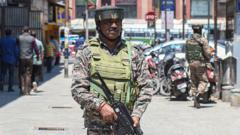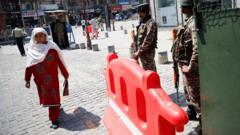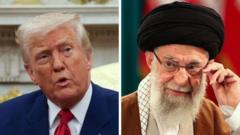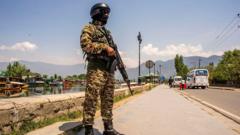Fresh calls for peace arise as India and Pakistan implement retaliatory measures following the Kashmir killings, threatening regional stability.
US Calls for De-escalation Amid Rising Tensions Following Kashmir Attack

US Calls for De-escalation Amid Rising Tensions Following Kashmir Attack
In a bid to mitigate escalating conflicts, the US has urged India and Pakistan to ease their tensions after a deadly assault in Kashmir.
The United States has made an urgent appeal for India and Pakistan to mitigate growing tensions stemming from a militant attack in Indian-administered Kashmir that resulted in the deaths of 26 civilians last week. Secretary of State Marco Rubio conducted separate discussions with India's Foreign Minister S. Jaishankar and Pakistan’s Prime Minister Shehbaz Sharif on Wednesday, urging both nations to prioritize peace and security in the South Asian region.
India blames Pakistan for enabling the militants responsible for the April 22 attack in Pahalgam, though Islamabad vehemently disputes these accusations. The deteriorating relationship has led India to announce a closure of its airspace to all Pakistani aircraft—a move seen as part of an ongoing cycle of retaliatory actions.
In response to the incident, Jaishankar remarked on social media that "perpetrators, backers, and planners" must face justice, echoed by Rubio expressing condolences and reaffirming American support for India's combat against terrorism. During talks, Sharif dismissed Indian claims linking Pakistan to the attack, urging the US to encourage India to temper its aggressive rhetoric.
Speculations are rife over potential military responses by India against Pakistan reminiscent of military actions post previous attacks in 2016 and 2019. Reports indicate that Modi has granted military leaders the autonomy to determine their response strategies following Pahalgam. Amidst the escalating tensions, both nations have exchanged fire across borders, further complicating the situation.
Recent developments include India's stern objection to what it describes as provocative ceasefire violations by Pakistan, as well as sanctions on various Pakistani citizens and channels. Following diplomatic amendments, over 780 Pakistani individuals have exited India, while a similar number of Indians have returned from Pakistan.
Amid this unrest, Kashmir remains a longstanding point of contention between the two nations since their separation in 1947, with ongoing insurgencies and the targeting of both military and civilian populations. The attack has prompted a surge of anger in India, with Prime Minister Modi pledging severe consequences for those behind it.






















